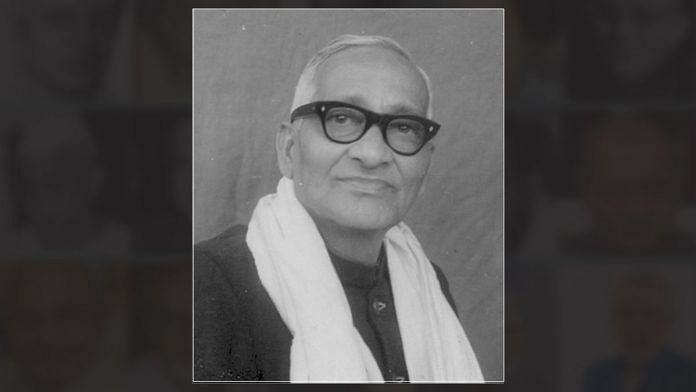New Delhi: Lokanath Misra, who served as the governor of three northeastern states, had once suggested that the right to propagate one’s religion should not be made a fundamental right.
On 6 December 1948, members of the Constituent Assembly were debating changes to the freedom of religion under Article 25, which was then treated as Article 19 in the draft Constitution.
Misra, who was a member of the assembly, argued, “If people should propagate their religion, let them do so. Only I crave, let not the Constitution put it as a fundamental right and encourage it.”
“Fundamental rights are inalienable and once they are admitted, it will create bad blood. I therefore say, let us say nothing about rights relating to religion. Religion will take care of itself. Drop the word ‘propagate’ in Article 19 at least,” he added.
Illustrious family
Misra was born on 21 November 1922 into an Odia Brahmin family. His father Godabarish Misra was a poet and socialist leader. A follower of Gandhian ideology, Godabarish opposed the caste system in India. He joined the Congress in 1928. In 1941, he became the education minister of Odisha.
Misra was the eldest son in the family. He studied in Ravenshaw College in Cuttack and worked as the managing editor of Daily Ganatantra from 1956 to 1961.
His second brother Raghunath was also Congress leader and a member of Odisha assembly. Former CJI Dipak Misra is Raghunath’s son.
Misra’s third brother, Ranganath, became the 21st Chief Justice of India in 1990.
His son Pinaki is a Biju Janata Dal (BJD) MP, besides being a senior lawyer of the Supreme Court.
Role in Constituent Assembly
As a member of the Constituent Assembly, Misra insisted that people may have the right to ‘propagate’ their religion among themselves, but including in the Constitution would not be good idea at all.
“…this unjust generosity of tabooing religion and yet making propagation of religion a fundamental right is somewhat uncanny and dangerous,” he said.
Touching upon the issue of conversion, he implicitly highlighted the need to protect “Hindu culture and religion in India”.
“Islam has declared its hostility to Hindu thought. Christianity has worked out the policy of peaceful penetration by the back-door on the outskirts of our social life,” he claimed.
“This is because Hinduism did not accept barricades for its protection. Hinduism is just an integrated vision and a philosophy of life and cosmos, expressed in organised society to live that philosophy in peace and amity. But Hindu generosity has been misused and politics has overrun Hindu culture,” he argued.
Misra’s debate, however, did not yield any favourable results as Article 25 still means, ‘Freedom of conscience and free profession, practice and propagation of religion’.
Political career
Misra, initially a Congress party member, was elected twice to the Odisha assembly. He later joined Swatantra Party, a breakaway faction of the Congress, which was founded by C. Rajagopalachari. Misra became the vice-president of the party.
In 1977, the Swatantra Party and few other political parties got together to form the Janata Party. Misra also joined this newly-formed outfit.
From 1960 to 1978, Misra was nominated to the Rajya Sabha for three consecutive terms. Between 1991 and 1997, he served as the Governor of Assam, Nagaland and Arunachal Pradesh.
Misra died on 27 May 2009 in Bhubaneswar, at the age of 87.




I am the son of Late Lokenath Mishra whose photograph has been posted in this article. He is not the one on whom about this information has been put up. My father was a member of the first Orissa assembly and continuously got elected from the Congress Party till 1967. He was a freedom fighter and was in prison for more than eight years during the British regime. Till the last breath of his life, he was in the congress party and towards the last days of his life, he supported Late Biju Pattnaik and remained with him in the congress party whereas, all other congress leaders left the party to form a state party “Jana Congress” headed by late Harikrishna Mahatab who opposed Late Biju Pattnaik . He expired in the year 1967 and was born in the year 1905. The Lokenath Mishra who has been described in this posting is a different person and belonged to the family you’ve described. I request you to immediately remove the photograph of my Late father and replace it with the correct one.
This photograph is not of lokanath Mishra please change